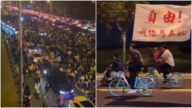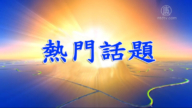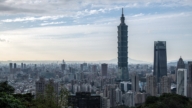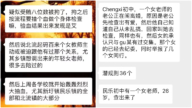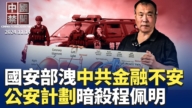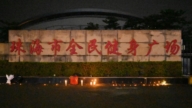【新唐人2012年9月7日讯】美国国务卿希拉里·克林顿与北京高层会谈,这次是希拉里任内最后一次访华,她会见了中共国家主席胡锦涛和总理温家宝,双方对南海争议、叙利亚、伊朗和朝鲜等问题,都各持己见,互不让步。中国不同阵营媒体也在希拉里访华问题上互相呛火。团报抨击党报“别拿爱国当生意来做”。学者指出,中美分歧是中共政权和美国政府价值观方面的差异造成的,并不代表中美人民之间存在分歧。
中共外交部长杨洁篪在与希拉里的联合记者会上说,“南海争议只牵涉直接影响的国家”,直接提出:反对美国介入的基调。中方并要求美方重新考虑亚洲政策。
美国官员指出,北京倾向与其他国家一对一解决争议。而希拉里表示,当中国国力渐强,影响力跨越国界时,美方希望中国是负责的国际领袖,协助解决问题,防止冲突。
北京注册会计师杜延林指出,中美双方的分歧,是因为双方的价值观等根本性的分歧,只要中共的政治体制不改变,或者中共的思路不改变,这个分歧是不会消除的。
北京注册会计师杜延林:“因为分歧主要是两个方面。一个方面是对人权的一个态度。这个显然美国和中国的分歧是非常宏大的。因为美国历来强调基本的普世价值,基本的人权。但是中方在这方面不会做出实际性的改变。因为如果做实际性改变,就等于承认他政权的非法性。”
第二个分歧是南海争端。杜延林说,美国不可能放弃对亚太地区安全的承诺。
《人民日报》旗下的《环球时报》在希拉里访华期间,抨击她是“深度强化中美互疑的人”。报导说,美国的最大战略利益是维护世界霸权,对中国崛起进行限制。而《中国青年报》发表“媒体别拿‘爱国’”当生意做”的文章,《中青报》不点名的批评《环球时报》等媒体,针对美国采取斗争性词汇,背后的对抗性心态显而易见。
杜延林指出,《中青报》和《环球时报》之间的论战,体现出目前中共意识形态的分裂。现在,中共政权内部,明确的有两派。
杜延林:“一派是比较务实的面对国际,比较承认普世价值的,比较实际的一种理念。温家宝是这一派的代表。另一派就是非常顽固的,从媒体上表现来说,最典型的就是《环球时报》。《环球时报》是中共强硬派或者民族主义或者左派的一个舆论阵地,他们历来是宣扬丛林法则,帝国主义亡我之心不死这种谬论的。”
杜延林说,中共喉舌媒体用愚民手段,调动民间的极端民族主义情绪,目地是掩盖国内矛盾,把真实的国际现状和真实的历史掩盖下去,以所谓的“爱国主义”作为维持政权的手段。但是在全球化的环境下,中共体制内或者媒体上,也有一些理智的声音。《中国青年报》就代表了这种声音。
而北京独立制片人朱日坤认为,所谓中美之间的分歧,是政府方面的分歧,因为中共政府的态度并不代表中国普通民众的立场。
北京独立制片人朱日坤:“ 领土也好,其他方面也好,本来是可以有很多办法去处理的。不一定是非得是一个争议问题,当成为一个争议问题的话,是因为在其他方面有无法解决的矛盾,比如政治,人权等等各方面。”
几天前,希拉里在出席南太平洋岛国论坛时表示:“南太平洋足够辽阔,可以容下美国和中国共存。”
而半年前,中共国家副主席习近平在访美前接受《华盛顿邮报》书面采访时也曾说过:“宽广的太平洋两岸,有足够空间容纳中美两个大国。”
《中国青年报》文章说,两人的两句话,从言说方式到核心内容高度一致,说明中美两国的决策层在达成根本共识方面,有了新的推进。
采访撰稿/秦雪 后制/朱娣
Hillary’s Visit to China Induces Debate Between Media of
Different Factions Inside the CCP
Hillary Clinton, the United States Secretary of State, recently
made her last visit to China during her term of office.
Clinton met with the CCP’s national president Hu Jintao
and premier Wen Jiabao in discussing the issues of Syria, Iran,
North Korea and territorial disputes in the South China Sea.
It was reported that both sides had stuck to their own views
without making any concession.
Chinese media from different political factions also attacked
each other on Clinton’s visit.
A report from the Youth League Faction criticized the other
faction by saying “do not treat patriotism as a business”.
Scholars remarked that, the difference of opinions between
China and the United States rooted from the differences of
value systems between two political regimes rather than
the differences between people of the two countries.
During the joint press conference with Hillary Clinton,
the CCP’s Foreign Minister Yang Jiechi said,
“the disputes in the South China sea should only involve
interested countries in the region.”
Such words directly objected to the interference
by the United States,
suggesting that the CCP asks the United States to
reconsider its policy on Asia-Pacific.
According to some American officials, the CCP preferred to
handle the dispute one on one with its neighbor countries.
On the other hand, Clinton said that as China’s national
strength became more solid, the United States expected China to act as a responsible.
global leader which provided help in solving regional issues and conflict prevention.
Du Yanlin, a Beijing certified public accountant remarked that,
the difference between China and the United States was a
radical one resulting from the huge gap between their value systems.
Such differences won’t disappear as long as the CCP’s
political regime or its thinking method remain the same.
(Du Yanlin, Beijing CPA): ”There are two major aspects
of the difference.
Firstly, these two countries have extremely different attitudes
toward human rights.
The United States always stresses the universal value of basic
human rights.
However, the CCP won’t make actual changes on this issue
otherwise it would be acknowledging that its governance has no legitimacy.“
The second difference lies in the disputes in the
South China Sea.
Du believes that the United States will never give up its
promise on protecting the safety of the Asia-Pacific region.
Global Times, an affiliated media of People’s Daily, criticized
Clinton as “a person who greatly intensified suspicions
between China and the United States” during her visit to China.
Global Times wrote that the United States regarded keeping
its hegemony and restricting China’s development as the biggest strategic interests.
This report was indirectly criticized by a China Youth Daily article
titled “Media should not treat patriotism as a business.”
The article wrote that, “some reports” had used aggressive
words against the United States which suggested an obvious antagonism from the persons behind them.
Du Yanlin remarked that, the debate between China Youth
Daily and Global Times clearly revealed an ideological division among the CCP ranks.
Du also mentioned two major factions inside the party.
(Du Yanlin):”First, there’s a faction who are more pragmatic
about global issues and accept more of the universal value system.
Wen Jiabao is a leader of this faction.
The other one is mostly composed of die-hard party members,
and Global Times is a most typical example of its media.
Global Times is a battle field of the nationalists and leftists
inside the CCP.
They always advocate the law of the jungle or ridiculous
slogans such as ‘Imperialism will never abandon its intention to destroy China’.”
Du remarked that, the CCP’s mouthpiece media attempted
to instigate extreme nationalist sentiment with obscurantist propaganda,
aiming at hiding the truth of history, domestic
conflicts and the real global situation;
the CCP regards “patriotism” as a tool to
maintain its governance.
On the other hand, there are also rational voices out of
the CCP’s system or media within the context of globalization,
as represented by the China Youth Daily’s article.
Beijing independent filmmaker Zhu Rikun believes that,
the so-called difference between China and the United States
is only at the governmental level since the CCP authority
cannot represent the standpoints of most Chinese civilians.
Zhu Rikun: ”There are lots of ways to handle territorial
or other issues without conflict.
When some kind of conflict breaks out, it suggests
unsolvable problems in other fields such as human rights.”
Days ago, when Clinton took part in the Pacific Island Forum
she mentioned
“the South Pacific is large enough to accommodate
the United States and China at the same time.”
While half a year ago, the CCP’s national vice president
Xi Jinping also told Washington Post before his visit to the United States that,
“the vast Pacific Ocean has enough space to accommodate
the two giant countries of China and the United States.”
China Youth Daily’s article remarked that, those two
statements were highly consistent both in language and content,
this suggests progress in sharing common views
between the leaders of China and the United States.


